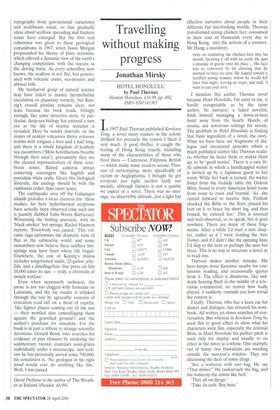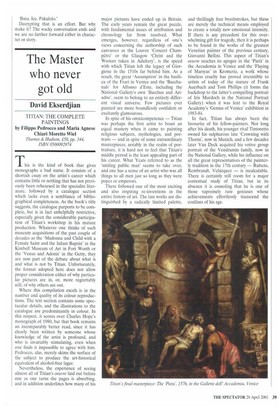Travelling without making progress
Jonathan Mirsky
HOTEL HONOLULU by Paul Theroux Hamish Ham Won, 116.99, pp. 492, ISBN 0241141303 In 1997 Paul Theroux published Kowloon Tong, a novel many readers in the colony disliked for precisely the reason I liked it very much. A good thriller, it caught the feeling of Hong Kong exactly, including many of the characteristics of those who lived there — Cantonese, Filipinos, British — which made some readers accuse Theroux of stereotyping, more specifically of racism or Anglophobia. I thought he got everyone just right, neither fairly nor meanly, although fairness is not a quality we expect of a novel. There was no message, no discernible attitude, just a light but
effective narrative about people in their different but interlocking worlds. Theroux transformed eating chicken feet, consumed in their tens of thousands every day in Hong Kong, into the actions of a torturer. Mr Hung, a murderer,
went on cramming the chicken foot into his mouth, finishing it off with his teeth. He spat a knuckle of gristle onto his plate ... His face was so contorted by his chewing that he seemed to have no eyes. He leaned toward a terrified young woman, whom he would kill later that night, leaving no trace, and said, 'I want to eat your foot.'
I mention this earlier Theroux novel because Hotel Honolulu, I'm sorry to say, is hardly recognisable as by the same author. Its narrator, a failed novelist, finds himself managing a down-at-heel hotel away from the beach. Hotels, of course, are notorious settings for novels. The problem in Hotel Honolulu is finding that basic ingredient of a novel, the story. What we have here are fragments of dialogue and occasional episodes which a much published author like Theroux realises, whether he hears them or makes them up, to be 'good stories'. There is a racy little episode in which a handicapped waiter is invited up by a Japanese guest to her room. While her back is turned, the waiter fishes from the bedside table the Gideon Bible, found in every American hotel room from coast to coast and beyond. 'As she canted forward to receive him, Fishlow chucked the Bible to the floor, placed his foot on it to brace his short leg, and thus braced, he entered her.' This is unusual and well-observed, so to speak, but it goes nowhere. There are many of these fragments. After a while I'd start a new chapter, rather as if I were reading the New Yorker, and if I didn't like the opening lines I'd skip to the next or perhaps the next but three. This is no way to structure a novel or to read one.
Theroux makes another mistake. His hero keeps Anna Karenina nearby for continuous reading, and occasionally quotes from it. •The effect is disastrous, like suddenly hearing Bach in the middle of a television commercial; no matter how badly played, it suddenly reminds you how trivial the context is.
Finally, Theroux, who has a keen ear for dialect and dialogue, has misused his notebook. All writers jot down snatches of conversation. But whereas in Kowloon Tong he used this to good effect to show what his characters were like, especially the colonial Brits, in Hotel Honolulu his perfect pitch is used only for display and usually to no effect in the novel as a whole. One example out of many: two Hawaiians are weeding outside the narrator's window. They are discussing the theft of some drugs.
'See a waheeny with one bag. He say "That mines!" He cuckaroach the bag, and the waheeny she armin like hell.'
'They all on djrugs.'
'Take da cash. Buy batu.' `Batu. Ice. Pakalolo.'
Decrypting that is an effort. But why make it? The wacky conversation ends and we are no farther forward either in character or story.



































































 Previous page
Previous page